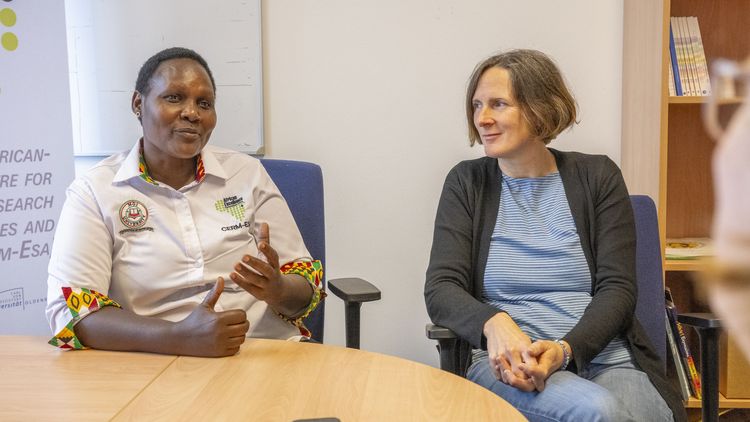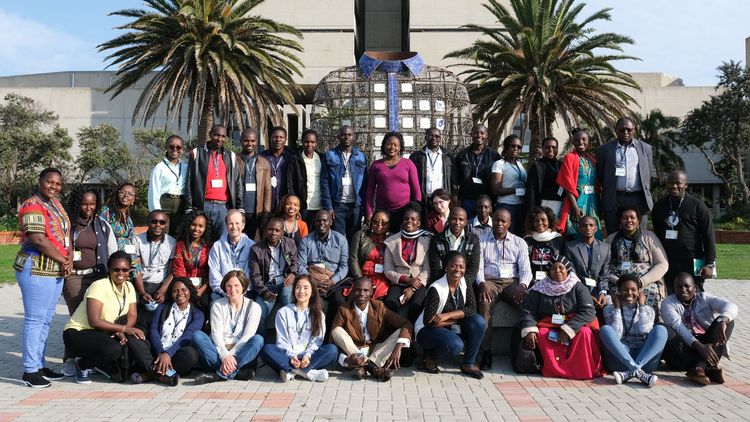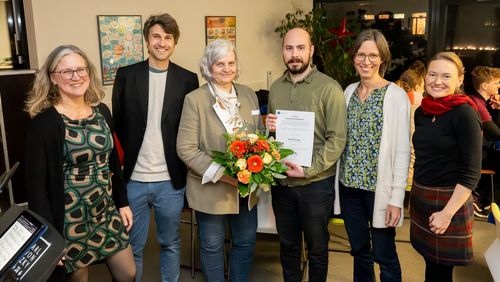University research that strengthens educational science as a subject and has a direct impact on the education system in East Africa – this is the aim of the CERM-ESA project at Moi University in Kenya. After a decade working on the project, coordinators Susan Kurgat and Malve von Möllendorff see clear positive impacts.
The career paths of the more than 60 graduates of the research-oriented Master of Education in Research degree programme at Moi University in Kenya are quite varied: some work in public administration, some have posts in school management, and others have embarked on careers in research and teaching.
But for Kenyan educational scientist Prof. Dr Susan Kurgat and her Oldenburg colleague Dr Malve von Möllendorff, what may sound like typical academic career paths represent the first fruits of their efforts to modernise the education system in East Africa. “We have alumni who advise the government on education issues, for example,” Kurgat underlines.
The internationally oriented Master’s degree programme is among the courses offered by the East and South African-German Centre of Excellence for Educational Research Methodologies and Management (CERM-ESA), which is based at Moi University in western Kenya. Since 2014, the German and African partners in the centre of excellence, which is funded by the German Academic Exchange Service (DAAD), have been working under the guidance of University of Oldenburg academics to teach and establish new methods in education research.
CERM-ESA has also been about teaching students new skills and methods – about showing how social change can be initiated through research and university–community partnerships.
“We wanted to promote innovative educational science research which is also relevant to educational practices and really improves the situation in the region – at schools, at universities and ultimately also when it comes to guiding educational policy," explains von Möllendorff, who helped shape the project from the outset and coordinates it together with Kurgat. Prof. Dr Bernd Siebenhüner and Prof. Dr Karsten Speck lead the project on the Oldenburg side.
With around 30,000 students, Moi University in Eldoret, western Kenya, is the second largest university in the country. Around 2,000 teachers are trained here every year for all the different levels of school education. However, young people at Kenya’s universities and schools face extremely difficult conditions, says von Möllendorff, explaining that the teaching and learning methods are often outdated and in many respects a legacy of the colonial era. This means that creativity, critical thinking and problem-solving are often hindered rather than encouraged. The high student-to-teacher ratio poses another major problem, as Kurgat stresses.
University research on topics related to education has also done little to solve the problems in the Kenyan education system, and all too often disappears into a drawer or gathers dust on bookshelves, explains von Möllendorff. “CERM-ESA has also been about teaching students new skills and methods – about showing how social change can be initiated through research and university–community partnerships.”
Valuable collaboration with Nelson Mandela University
Together with participants from other partner institutions – the Nelson Mandela University in South Africa, the Uganda Management Institute and the University of Dar es Salaam – the project partners have established various focus areas aimed at strengthening the connection between research and practice. University lecturers from the participating African institutions have learned in courses and workshops about new research and teaching methods and dealt with questions such as how to provide students and doctoral students with optimal supervision. Kurgat and von Möllendorff emphasise that the collaboration with the Nelson Mandela University has been extremely valuable in the development of these courses. The South African university is among Africa’s leading institutions in the areas of educational research and teacher training.
A wide range of scholarships are now available to the students who come here from countries across East Africa. The project partners have also established a new doctoral degree programme that offers students on the research-based Master's programme the prospect of an academic career. Regular workshops and training programmes on current research topics and methods, university didactics and digitalisation round off the range of courses on offer.
We have all learnt a lot from one another over the course of the project. That’s one of its great strengths.
To make are real impact in the region, CERM-ESA offers advanced training for teachers and members of management at schools in the area. Owing to the large class sizes, it is often difficult for teachers to give their pupils attention on a one-to-one basis, explains Kurgat. There is a danger of them relapsing to old teaching methods. “Here we teach teaching staff for example how to use creative and computer-aided methods to give their pupils more individual attention,” says the educationalist.
For von Möllendorff, this is an example of how, over the years, the project participants have come ever closer to their goal of not only modernising university teaching and research, but also helping to improve the education system in the region. “It wasn't always easy, but together we have mastered the challenges,” she says.
“We have all learnt a lot from one another over the course of the project,” adds Kurgat. “That’s one of its great strengths.” She takes pride in the professional achievements of the first graduates of the research-oriented Master's and doctoral degree programmes, and commends the current 25 Master’s students and 12 doctoral students: “Our students are very dedicated, and they pass on the knowledge they acquire as well as their dedication to other students.” In this way, CERM-ESA has a positive impact on the institution as a whole.
Follow-up project makes course content available online
Much of what has been achieved is a result of the project’s long duration, says von Möllendorff. “This was what allowed us to build the mutual trust that was necessary for our work,” she adds. Kurgat is also grateful that the DAAD supported the project not just financially, but also in non-material ways over such a long period of time. The DAAD will continue to fund the programme until the end of 2028 – albeit with a reduced level of funding which will be used, for example, to maintain the scholarship programmes.
To ensure that the results of the CERM-ESA excellence centre are consolidated and made accessible to other educational institutions in Africa, the participants are now focusing on digitalisation in a follow-up project. In DIGI-FACE, a project led by Kehl University of Applied Sciences, the partners are processing and digitalising their knowledge and insights for use in online workshops and courses. In this way, the results will also flow into the training of students and teachers at other specialised centres in Africa that are likewise funded by the DAAD.
The current CERM-ESA students are already benefiting from this. Although there is less funding for the degree programmes at the Centre of Excellence, and fewer on-campus courses, thanks to the teaching content and resources that are now available online the courses can still be maintained.







